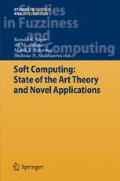Abstract
Weighted power means are a flexible and powerful family of aggregation functions. The simplest member of this family, the weighted arithmetic mean, previously has been adapted for interval type-2 fuzzy scores and weights. This operator has been termed a “linguistic weighted average,” and has been a primary instantiation of a “perceptual computer” in recent literature. We present an algorithm for computing weighted power means of arbitrary power for type-1 or interval type-2 fuzzy inputs and weights, which we call “linguistic weighted power means.” We compare the linguistic weighted power mean and the linguistic weighted average on an “investment judgment advisor” example. Our results illustrate the flexibility and range of logical inference provided by this very versatile aggregation operator for computing with words applications.
Access this chapter
Tax calculation will be finalised at checkout
Purchases are for personal use only
Preview
Unable to display preview. Download preview PDF.
References
Dubois, D., Prade, H.: A review of fuzzy set aggregation connectives. Inf. Sci. 36, 85–121 (1985)
Salton, G., Fox, E.A., Wu, H.: Extended Boolean information retrieval. Communications of the ACM 26(12), 1022–1036 (1983)
Hong, W.S., Chen, S.J., Wang, L.H., et al.: A new approach for fuzzy information retrieval based on weighted power-mean averaging operators. Computers & Mathematics with Applications 53(12), 1800–1819 (2007)
Dujmović, J.: Continuous preference logic for system evaluation. IEEE Trans. on Fuzzy Systems 15(6), 1082–1099 (2007)
Gärdenfors, P.: Conceptual Spaces: The Geometry of Thought. MIT Press (2000)
Goldstone, R.: Influences of categorization on perceptual discrimination. J. Experimental Psychology: General 123, 178–200 (2000)
Schyns, P., Goldstone, R., Thibaut, J.-P.: The development of features in object concepts. Behavioural and Brain Science 21, 1–54 (1998)
Gigerenzer, G., Todd, P., and the ABC Research Group: Simple Heuristics That Make Us Smart. Oxford University Press, NY (1999)
Liu, F., Mendel, J.M.: Aggregation using the fuzzy weighted average as computed using the Karnik-Mendel algorithms. IEEE Trans. Fuzzy Syst. 17(6) (2009)
Mendel, J.M., Wu, D.: Perceptual Computing. John Wiley & Sons, Inc., Hoboken (2010)
Zadeh, L.A.: Fuzzy logic = computing with words. IEEE Trans. Fuzzy Syst. 4, 103–111 (1996)
Special Section on Computing with Words. IEEE Trans. Fuzzy Syst. 18 (June 2010)
Mendel, J.M.: Computing with words: Zadeh, Turing, Popper and Occam. IEEE Computational Intelligence Magazine 2, 10–17 (2007)
Yager, R.R.: Approximate reasoning as a basis for computing with words. In: Zadeh, L.A., Kacprzyk, J. (eds.) Computing with Words in Information/Intelligent Systems I: Foundations, pp. 50–77. Physica-Verlag, Heidelberg (1999)
Yager, R.R.: On the retranslation process in Zadeh’s paradigm of computing with words. IEEE Trans. on Systems, Man, and Cybernetics—Part B: Cybernetics 34, 1184–1195 (2004)
Zadeh, L.A.: Toward human-level machine intelligence—Is it achievable? The need for a new paradigm shift. IEEE Computational Intelligence Magazine 3, 11–22 (2008)
Wagner, C., Hagras, H.: Toward general type-2 fuzzy logic systems based on zSlices. IEEE Trans. on Fuzzy Systems 18(4), 637–660 (2010)
Yager, R.R.: On ordered weighted averaging aggregation operators in multi-criteria decision making. IEEE Trans. Syst. Man Cybern. 18, 183–190 (1988)
Larssen, H.: Efficient andness-directed importance weighted averaging operators. Int. J. Uncertainty, Fuzziness, Knowledge-Based Syst. 12, 67–82 (2003)
Dujmović, J., Larsen, H.L.: Generalized conjunction/disjunction. Int. J. Approx. Reas. 46, 423–446 (2007)
Dujmović, J.: Partial absorption functions. J. Univ. Belgrade, EE Dept. Ser. Math & Physics (659), 156–163 (1979)
Rickard, J.T., Aisbett, J., Yager, R., Gibbon, G.: Fuzzy weighted power means in evaluation decisions. In: Proc. World Symposium on Soft Computing, Paper #100, San Francisco, CA (2011)
Wu, D., Mendel, J.M.: Aggregation using the linguistic weighted average and interval type-2 fuzzy sets. IEEE Trans. on Fuzzy Systems 15(6), 1145–1161 (2007)
Wu, D., Mendel, J.M.: Corrections to ‘Aggregation using the linguistic weighted average and interval type-2 fuzzy sets’. IEEE Trans. on Fuzzy Systems 16(6), 1664–1666 (2008)
Klir, G., Yuan, B.: Fuzzy Sets and Fuzzy Logic. Prentice-Hall, Upper Saddle River (1995)
Tong, R.M., Bonissone, P.P.: A linguistic approach to decision making with fuzzy sets. IEEE Trans. Syst., Man, Cybern. SMC-10, 716–723 (1980)
Liu, F., Mendel, J.M.: Aggregation using the fuzzy weighted average as computed using the Karnick-Mendel algorithms. IEEE Trans. Fuzzy Syst. 17 (December 2009)
Rickard, J.T., Aisbett, J., Yager, R., Gibbon, G.: Linguistic weighted power means: comparison with the linguistic weighted average. In: Proc. FUZZ-IEEE 2011, 2011 World Congress on Computational Intelligence, Taipei, Taiwan, pp. 2185–2192 (June 2011)
Trillas, E., Moraga, C., Guadarrama, S., Cubillo, S., Castiñeira, E.: Computing with Antonyms. In: Nikravesh, M., Kacprzyk, J., Zadeh, L.A. (eds.) Forging New Frontiers: Fuzzy Pioneers I. STUDFUZZ, vol. 217, pp. 133–153. Springer, Heidelberg (2007)
Author information
Authors and Affiliations
Corresponding author
Editor information
Editors and Affiliations
Rights and permissions
Copyright information
© 2013 Springer-Verlag Berlin Heidelberg
About this chapter
Cite this chapter
Rickard, J.T., Aisbett, J., Yager, R.R., Gibbon, G. (2013). Computing with Words Using Weighted Power Mean Aggregation Operators. In: Yager, R., Abbasov, A., Reformat, M., Shahbazova, S. (eds) Soft Computing: State of the Art Theory and Novel Applications. Studies in Fuzziness and Soft Computing, vol 291. Springer, Berlin, Heidelberg. https://doi.org/10.1007/978-3-642-34922-5_11
Download citation
DOI: https://doi.org/10.1007/978-3-642-34922-5_11
Publisher Name: Springer, Berlin, Heidelberg
Print ISBN: 978-3-642-34921-8
Online ISBN: 978-3-642-34922-5
eBook Packages: EngineeringEngineering (R0)

